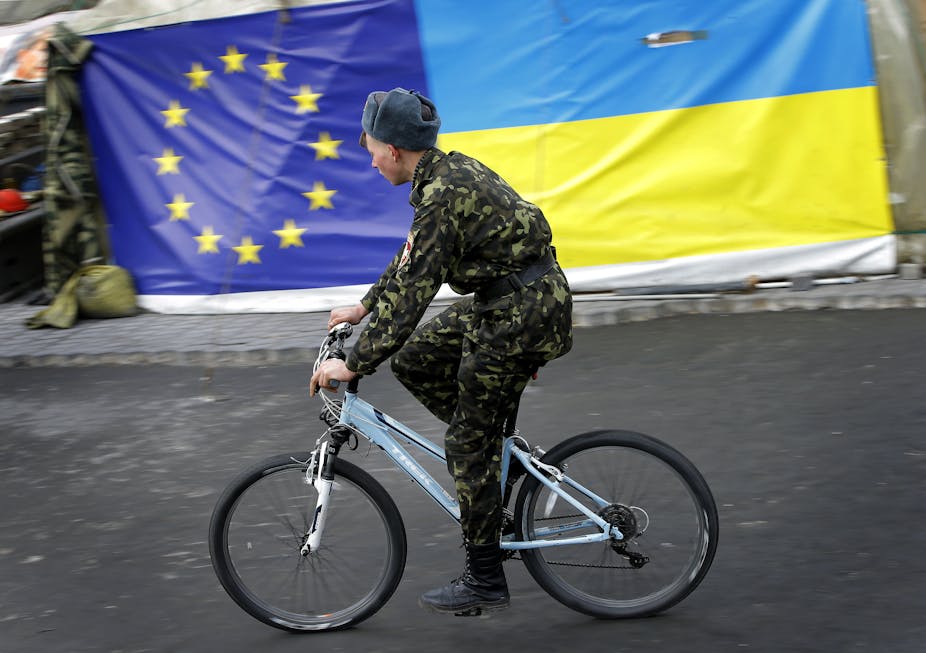The current stand-off between Russia and Ukraine has left the European Union looking perhaps flatfooted and ineffectual. It is an unfair reflection of reality. The EU is not a military alliance and so an EU military response is unthinkable and indeed impossible. But if sanctions are to be the only weapon in the EU’s arsenal, then it does have a potentially very effective option to explore.
Faced with Russian actions in Crimea which involved sending in first unmarked militiamen and then openly Russian armed forces and tanks, the EU is of course at a severe disadvantage: for that is not how things are done in the EU. In fact it is not to Crimea’s apparent wish to join with Russia that the EU objects: it is to the way in which this was done. Russian tanks roll in, a referendum is organised within a matter of weeks without any campaigning and in an atmosphere of intimidation; and more than 90% of the votes cast are in favour of Crimea joining Russia. Such a way of doing things is a throwback to the worst aspects of Soviet bullyboy tactics such as were seen in Hungary and in Czech Republic in the 1950s and 1960s.
In the face of this there is a widely shared conviction that the EU must somehow act, not so much to punish Russia (as Barack Obama pointed out in Brussels last weeek) or to take Crimea back into Ukraine, but rather to make the point forcefully that such behaviour is just no longer acceptable in Europe. Any such message must be passed peacefully but emphatically. Expulsion of Russia from the G8 makes Russia lose face in the West but is easily shrugged off by president Vladimir Putin and foreign minister Sergei Lavrov.
Systematic trade sanctions would hurt the EU as much as they would hurt Russia in view of the extensive trade and commerce in both directions and in particular because of the dependence of many EU states on Russian gas. But that does not mean that there cannot be an effective response to Russian actions. There can be and it would be poetically effective if EU politicians can screw up the courage to implement it.
Racist undercurrents
Consider the officially declared Russian position . They claim that they had to intervene militarily in Crimea (and soon perhaps in other parts of Ukraine and in Moldova?) to protect the rights of ethnic Russians and/or holders of Russian passports. I am not the first to point out that there is an uncanny resemblance with Hitler’s argument for the Anschluss of Austria in the 1930s.
While there may be some extreme nationalists present in the Kiev protest movement it is crystal clear that the vast majority of the protesters were committed to a civilised peaceful protest designed to encourage their government to bring Ukraine closer to the European Union, for them a pinnacle and exemplar of civilisation. It is precisely because of this touching faith in the European ideal that the European Union must respond with generosity and solidarity.
However this argument of a responsibility to defend ethnic Russians is essentially racist. Far from being an argument for the defence of universal human rights it is at best a selective argument for the defence of the human rights of ethnic Russians and so is irretrievably tainted with racism. Russia takes it upon itself, without any endorsement from any of the many human rights bodies of which it is a member (Council of Europe, United Nations), to defend the human rights … of Russians, not, you will note, universal human rights.

Russian passport holders are present not only in Ukraine but also in a variety of EU countries: and this in quite significant numbers in such states as Latvia, Estonia, UK. This at once poses a potential, if hypothetical, threat to peace and security in the EU. How are we to know where else might Russia seek to intervene militarily in defence of its citizens? And if we are to judge by Russian activities in seeking to bully the Estonians and the Latvians perhaps this threat is not so hypothetical. Moreover some nationalists in the Russian parliament openly advocate the re-annexation of all of the territories of the old Soviet Union into today’s Russian Federation.
Closed-door policy?
But this also offers the EU an intriguing and powerful weapon. If Russia wishes to reserve the right to intervene anywhere in the world to defend the rights of its passport holders then quite simply the EU in order to defend its security should deny to Russian passport holders rights of residence. Any Russian wishing to reside in the EU should quite simply be required to renounce Russian nationality. Furthermore Russians should be debarred from ownership of real estate within the EU either directly or through front companies; and moreover any Russians or Russian companies currently holding any real estate within the EU should be expropriated through compulsory purchase orders which would however offer full and fair compensation to the expropriated Russian owners (the EU is civilised, after all).
This is perfectly feasible as a policy option for the EU (since all EU states maintain a land registry); and it would be a supremely effective sanction that would put direct and immediate personal pressure on the oligarchic circle of crony capitalists that runs Russia (and which you could argue seeks surreptitiously to run much of the rest of the world as a mafia fiefdom). Such a sanction policy targeted at private property and expropriation is not something that one recommends with joy: but as German chancellor Angela Merkel is beginning to realise and as the Estonians, Latvians, Poles and indeed Moldovans have long realised, with Russia it is a tough and dirty game. Europe needs therefore to show a tough but balanced response.

